10 Amazing Keyword Research Tools for Search Marketing
- Last Edited September 23, 2025
- by Garenne Bigby
Keyword Research Tools
1. Google Keyword Planner
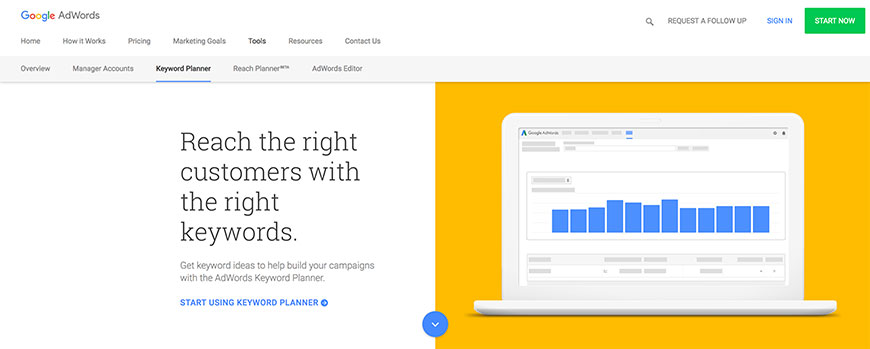
2. Google AdWords: Search Term/Query Reports
3. Spyfu

When users are facing stiff competition, it helps to have an inside track on what business rivals are doing in terms of strategy. This is where Spyfu comes in; with this tool, users can develop a marketing strategy directly from their competitors. With only a competitor’s URL, Spyfy can download their entire PPC keyword selection and AdWords Keyword groups. This way, users can determine if their rivals are using keywords they don’t know about.
This tool can also download a competitor’s negative keyword matches, test histories, and AdWords campaigns. With this kind of information, users can learn from their rivals’ missteps, avoiding needless ad expenses. Finally, Spyfu can track anyone bidding on a user’s keywords, as well as track search rankings and advise users on new AdWords. The only drawback to Spyfu is that it is not offered for free.
The basic plan begins at $33-39 per month, depending on whether or not users opt for an annual subscription. Though this would be sufficient for new users, more experienced/affluent ones might prefer the Professional or Team packages. Regardless, with its ability to snoop through a competitor’s keyword research, Spyfu is well worth the investment and should be considered.
4. KWFinder
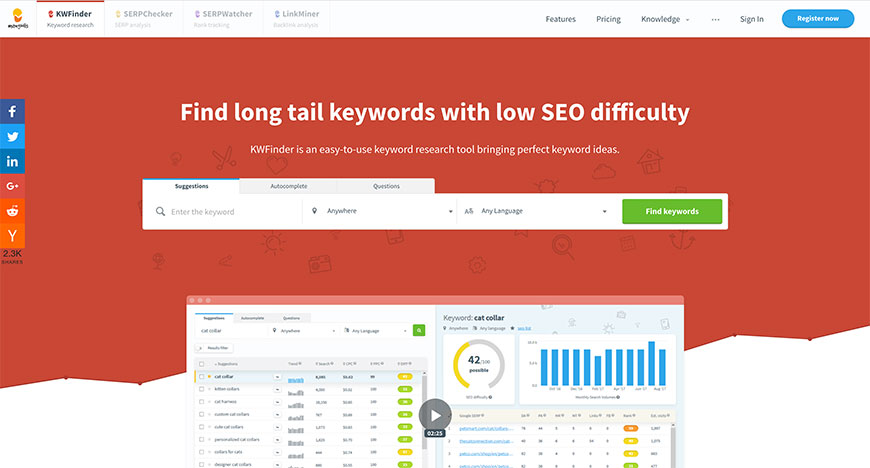
In the same vein as Google’s AdWords tool suite, the KWFinder is an effective keyword research tool. With its ability to show keyword suggestions, keyword trends over time, CPC and search difficulty, KWFinder gives users a good place to start in their research. Naturally, users with sound search methodologies—who add filters, such as negative keywords—will get better results. Going beyond simple keyword suggestions, KWFinder provides data on the top-ranked sites for each keyword.
With details such as the number of external links, page authorities, Facebook and Google shares, and estimated visits per month, users can see how they stack up. When assessing a keyword’s search difficulty, KWFinder summarizes external links, page and domain authority, and social signals to give a score out of 100. Furthermore, KWFinder can capitalize on long-tail keywords to provide hundreds of suggestions—some of which competitors may have missed.
Finally, KWFinder can narrow its search to keyword data from specific locations, giving users the most narrow, targeted data possible. When one considers that KWFinder is free to use, this is an incredible value for such service. If a user needs to do extensive keyword research on a budget, KWFinder is the tool for the job.
5. Moz’s Keyword Explorer

One of the most well-known programs for Search Engine Optimization, the Moz PRO suite offers an extensive toolkit for anything search-related, including keyword research. If a user can afford to sign up with Moz, the Keyword Explorer makes researching keywords a snap. The Explorer’s interface is easy to use and provides detailed information on potential keywords. Users can manage multiple keyword lists from the Explorer and fine-tune them as necessary.
Keyword Explorer holds an extensive online keyword database and refreshes its search results data every two weeks to stay up-to-date. This tool intuitively generates new keyword suggestions and compares keywords across ranked sites. Complex keyword analysis is easy with the Explorer’s ability to track key metrics. By assessing monthly search volume, SERP features, search difficulty and more, users can get a good sense of how their keywords will perform. As mentioned earlier, Moz is not offered for free, although a 30-day free trial is available if users want to test it out.
With plans starting at $99 per month— or $79 per month if users take a yearly subscription— Moz is far from cheap. That said, if users need a quality research tool, and maybe more later—Moz is worth every penny.
6. Keyword Tool
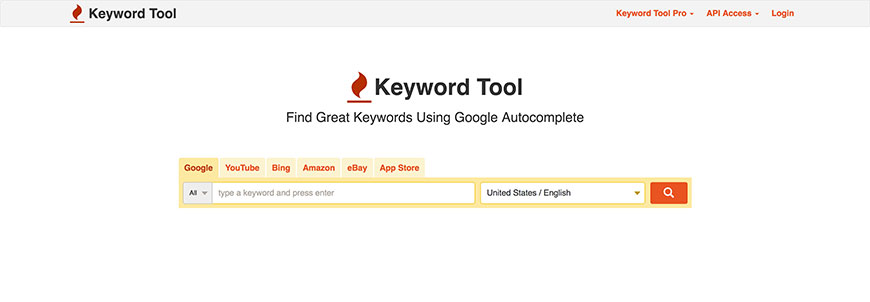
With a name that says it all, the Keyword Tool is another effective addition to any user’s toolbox. Available to any user free of charge, this program can generate over 750 long-tail keywords for any search term. Able to find keywords that even Google programs can miss, the Keyword Tool lets users quickly add to their search term repertoire. Offering remarkable versatility, the Keyword Tool can uncover keywords for YouTube, Bing, Amazon, the App Store, and eBay, in addition to Google. With the Keyword Tool, any marketing platform is open to users.
In addition, users can also find detailed keyword information with this program, but not with the free version; for these details, they will need to upgrade to Keyword Tool Pro. At $88 monthly, this can be expensive, but if users are marketing across multiple platforms, it is well worth the price. Once users upgrade, they gain access to useful metrics like keyword search volumes, CPC, and AdWords competition.
Furthermore, users can view the average monthly searches for given keywords, thus gaining a good sense of how frequently they are used. For users who market to multiple platforms, and can afford to spend a little, the Keyword Tool is tough to beat.
7. SEMrush
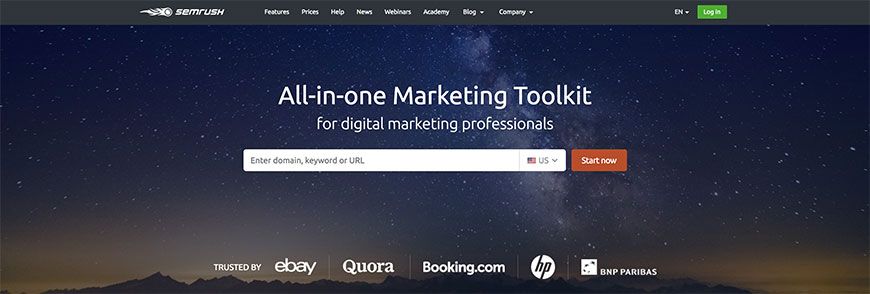
Regardless of whether users opt for organic or paid search marketing, SEMrush is a useful keyword tool. Able to assess keywords in over 131 countries, SEMrush can generate both short-tailed and long-tailed keywords. When searching for keywords, users can utilize advanced filters, including broad vs. exact matches, CPC range, competition level, and volume range.
Upon search completion, this program kicks back details such as a number of results, trends, ad copies, and more for each keyword. SEMrush can also point out the biggest users of each keyword, along with the most popular websites that get clicked. This kind of detailed research can help users assess their competitors. Finally, SEMrush can analyze data from both mobile and desktop indices.
No matter what device users have, SEMrush can work with it. While SEMrush’s keyword research features are offered for free, tracking keywords require a paid subscription, which starts at $99 per month. While this is on the pricey side, SEMrush’s array of features is an invaluable asset, especially if users need to go beyond keyword research to a full SEO campaign. For users who need a potent keyword research toolkit, and are willing to pay for it, SEMrush, is tough to beat.
8. WordStream’s Free Keyword Tool
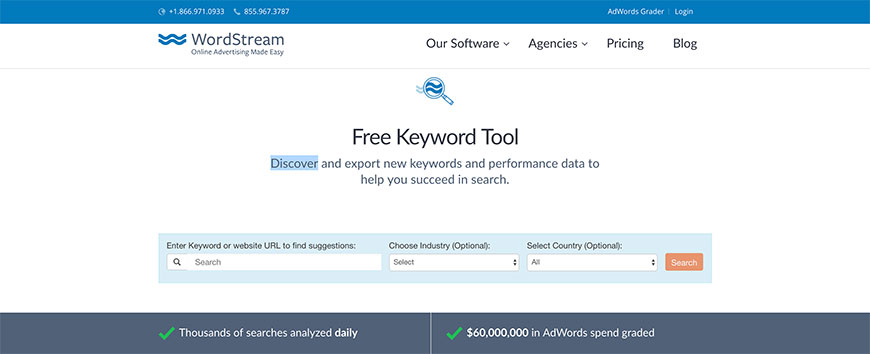
Offered by WordStream free of charge, this Keyword Tool is useful for both SEO and paid search marketing. By analyzing thousands of daily searches—which amounts to $60,000,000 in AdWords spending—this program can quickly and easily spot any and all keywords that users need. With only a website URL or one keyword, this Tool can generate hundreds of keywords specific to one location or business. Retrieved keywords are broken down by competition score, estimated cost per click, and an opportunity score. With this kind of information, users can better assess how best to spend their advertising dollars. WordStream’s product can also target specific niches to yield additional suggestions, or group like words together for ad launches.
While this program is free, only the first 30 searches are allowed without an account. For more searches, users will need to sign up with WordStream, though a 7-day trial is allowed along with the 30 free searches. Compatible with Google AdWords, this program includes a Performance Grader to further assess users’ keywords, taking the uncertainty out of a marketing campaign. With its excellent keyword research capabilities, WordStream’s Keyword Tool is an asset to any paid search campaign, especially ones on a stringent budget.
9. Soovle

Despite the unusual name, Soovle is a top-notch keyword research asset with unparalleled versatility. Not limited to just Google keyword, Soovle can explore keywords on other platforms, such as Wikipedia, Bing, YouTube, Yahoo, and Amazon. Regardless of which platform users choose, Soovle can rapidly generate potential keywords from just a few button presses. Any keyword entered into it automatically generates a list of nearly all potential spellings of that word. In addition, Soovle has a Saved Selections feature, allowing users to quickly retrieve their results for later analysis.
With this kind of functionality, Soovle doubles as both a keyword researcher and a brainstorming asset. Users who are still pondering their search terms in the broadest sense can muddle with Soovle’s search box. This kind of freestyle search pattern can help a user develop and refine his or her keyword ideas. The very definition of a free offering, Soovle is available on its own website, which users can easily make their own homepage for easy access to this tool. If users need a quick, easy to use, versatile program for keyword generation and brainstorming, they will find a lot to like about Soovle. When users need content ideas in a hurry, Soovle is the one to call.
10. Serpstat
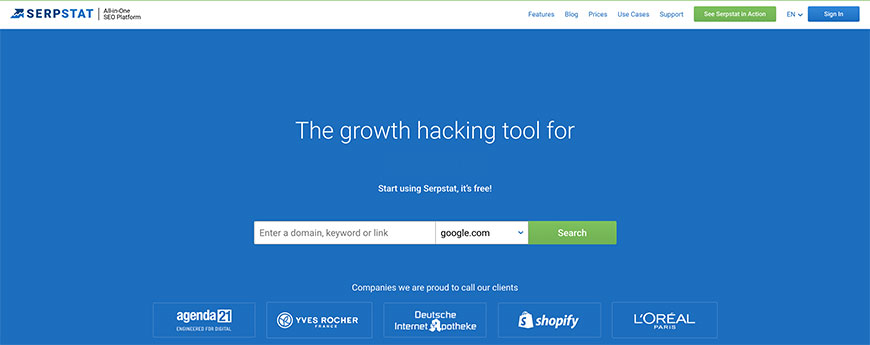
Hailed as an all-in-one SEO toolkit, Serpstat’s Keyword Research functionality is state of the art. The first of its kind, this program offers a page-oriented platform along with a deep competitive analysis. Serpstat users can easily locate competitors and define any missing keywords, whether from one URL or the entire domain. Going beyond simple keyword searches, this tool can research niche questions and devise tactics to divert search traffic to a given website. Serpstat’s unique “tree-view” subroutine helps users check a page’s position in search results, improve ones that are lagging behind, and gain additional site traffic.
Serpstat’s Search Suggestions subroutine can help users discover related keywords, thus expanding their database of keywords. It can even run the analysis on competitors so that users can glean their strategies and possibly gain more keywords. Spanning 12 Google databases, Serpstat’s library includes over 1,000,000 keywords. Not content to stagnate, this program updates 15,000 words every day. Even though it lends itself more towards organic SEO, Serpstat is still a valuable tool for content marketers. Any user who needs a good keyword research tool and a valuable asset for building a solid SEO campaign will remember Serpstat’s effectiveness.